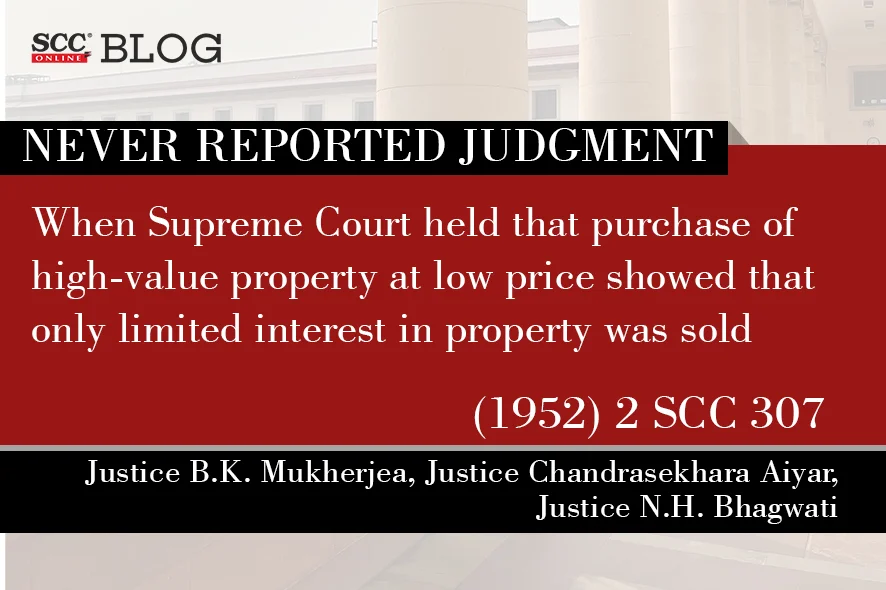Supreme Court: The 3-Judges Bench of B.K. Mukherjea, Chandrasekhara Aiyar*, and N.H. Bhagwati, JJ., opined that what was sold in the auction was the right, title, and interest of Saroj Bala, and on the facts it was obvious that she had no absolute interest in the property. The Supreme Court agreed with the Subordinate Judge that paying a low price of Rs. 205 for a property worth several thousand could have been only because limited interest was being sold. The Supreme Court thus dismissed the appeal with costs.
Background
The property in dispute, Premises 7, Kalimuddin Lane, Calcutta, was one of the items comprised in the properties allotted to Saroj Bala, widow of Amulya Nath, under the award decree in the partition suit filed by Profulla Kumar Bose. One Amodini Dasi obtained a money decree for Rs. 207-12-0 against Saroj Bala, being her share of the patni rent payable in respect of patni tenure which they held in common. In execution of the money decree, the suit property valued at Rs. 27,000 on date of award and estimated at Rs. 40,000 in the written statement was sold and was purchased in 1936 by appellant for Rs. 205. Respondent, who was the daughter’s son of Amulya Nath and Saroj Bala, was born in 1924. The daughters, Sudhansubala and Sovanabala died in 1928 and 1926, respectively. Saroj Bala died on 05-11-1941. Respondent sought recovery of possession of the property from appellant by notice dated 18-11-1941. As appellant did not give up possession, respondent filed the suit out of which the present appeal arose, claiming recovery of possession and mesne profits from the date of appellant’s mother’s death.
Respondent contended that he purchased at the auction sale, the absolute interest in the property and not merely the widow’s estate of Saroj Bala. The Additional Subordinate Judge (‘Subordinate Judge’) held that only the widow’s interest passed under the sale and awarded appellant a decree and the Calcutta High Court (‘High Court’) confirmed this finding and dismissed respondent’s appeal.
Analysis, Law, and Decision
The Supreme Court opined that there were no merits in this appeal, either in law or on fact. The Supreme Court noted that appellant’s counsel contended that Saroj Bala had an absolute estate in the property and not merely the limited interest of a Hindu widow, having got it along with other properties under the partition decree based on an award. The Supreme Court opined that apart from the fact that there was nothing in the final decree creating an absolute interest in the widow, it was not open to appellant to raise any such question now and though appellant pleaded that Saroj Bala got the properties absolutely, no issue was taken on the point, and the trial before the Additional Subordinate Judge proceeded on the footing that Saroj Bala had only a limited interest.
The Supreme Court noted that appellant’s contention was that there was legal necessity, as the decree in execution of which the property was brought to sale was obtained against Saroj Bala for her share of the patni rent due and payable. The Supreme Court also noted that the Subordinate Judge held there was no legal necessity and no evidence was adduced on appellant’s side about necessity. The Supreme Court opined that the High Court did not go into the question, as it was clear that appellant could not get anything more than he purchased, namely, the limited interest of the widow.
The Supreme Court opined that the contention that the entire estate passed under the sale, was vain and frivolous. The Supreme Court opined that what was sold was the right, title, and interest of Saroj Bala, and on the facts it was obvious that she had no absolute interest. The Supreme Court opined that the decree-holder, when it was found there were no bids for the property for the upset price fixed, made it clear by means of an affidavit that what was being brought to sale was only the right, title and interest of the widow, and that appellant after a scrutiny of the records by his pleader whom he had specially engaged for the purpose, purchased the property through the very same pleader for Rs. 205. The Supreme Court agreed with the Subordinate Judge that this low price for a property worth several thousand could have been only because limited interest was being sold. Thus, the Supreme Court dismissed the appeal with costs.
[Naresh Chandra Bose v. Sujoy Kumar Dutta, (1952) 2 SCC 307, decided on 29-10-1952]
*Judgment authored by: Justice Chandrasekhara Aiyar
Note: Limited/Absolute interest in property
Under the old Hindu Law only ‘streedhan’ (properties gifted to a woman at the time of marriage by both sides of the family and by relatives and friends) was the widow’s absolute property and she was entitled to the other inherited properties only as a life-estate with limited powers of alienation, if at all. The Hindu Succession Act, 1956 (‘the Act’) came into force with a view to confer absolute ownership on Hindu female in property which was in her possession when the act came into force. The concept of limited estate of Hindu female ceased to exist and reversionary rights were abolished. The Act reformed the Hindu personal laws and gave women greater property rights, allowing women full ownership rights instead of limited rights in the property they inherited from their husbands under Section 14 of the Act.
Advocates who appeared in this case :
For the Appellant: Hari Gopal Roy, Advocate
For the Respondent: N.C. Sen Gupta, Senior Advocate (Biswa Nath Mukherjee, Advocate, with him)







